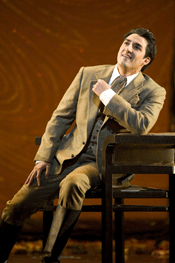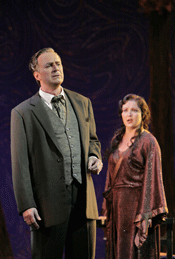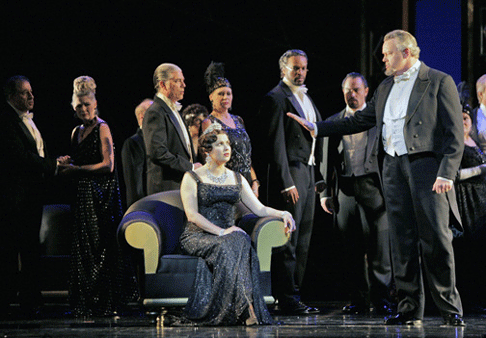Recently in Reviews
English Touring Opera are delighted to announce a season of lyric monodramas to tour nationally from October to December. The season features music for solo singer and piano by Argento, Britten, Tippett and Shostakovich with a bold and inventive approach to making opera during social distancing.
This tenth of ten Live from London concerts was in fact a recorded live performance from California. It was no less enjoyable for that, and it was also uplifting to learn that this wasn’t in fact the ‘last’ LfL event that we will be able to enjoy, courtesy of VOCES8 and their fellow vocal ensembles (more below …).
Ever since Wigmore Hall announced their superb series of autumn concerts, all streamed live and available free of charge, I’d been looking forward to this song recital by Ian Bostridge and Imogen Cooper.
The Sixteen continues its exploration of Henry Purcell’s Welcome Songs for Charles II. As with Robert King’s pioneering Purcell series begun over thirty years ago for Hyperion, Harry Christophers is recording two Welcome Songs per disc.
Although Stile Antico’s programme article for their Live from London recital introduced their selection from the many treasures of the English Renaissance in the context of the theological debates and upheavals of the Tudor and Elizabethan years, their performance was more evocative of private chamber music than of public liturgy.
In February this year, Albanian soprano Ermonela Jaho made a highly lauded debut recital at Wigmore Hall - a concert which both celebrated Opera Rara’s 50th anniversary and honoured the career of the Italian soprano Rosina Storchio (1872-1945), the star of verismo who created the title roles in Leoncavallo’s La bohème and Zazà, Mascagni’s Lodoletta and Puccini’s Madama Butterfly.
Evidently, face masks don’t stifle appreciative “Bravo!”s. And, reducing audience numbers doesn’t lower the volume of such acclamations. For, the audience at Wigmore Hall gave soprano Elizabeth Llewellyn and pianist Simon Lepper a greatly deserved warm reception and hearty response following this lunchtime recital of late-Romantic song.
Collapsology. Or, perhaps we should use the French word ‘Collapsologie’ because this is a transdisciplinary idea pretty much advocated by a series of French theorists - and apparently, mostly French theorists. It in essence focuses on the imminent collapse of modern society and all its layers - a series of escalating crises on a global scale: environmental, economic, geopolitical, governmental; the list is extensive.
For this week’s Live from London vocal recital we moved from the home of VOCES8, St Anne and St Agnes in the City of London, to Kings Place, where The Sixteen - who have been associate artists at the venue for some time - presented a programme of music and words bound together by the theme of ‘reflection’.
'Such is your divine Disposation that both you excellently understand, and royally entertaine the Exercise of Musicke.’
Amongst an avalanche of new Mahler recordings appearing at the moment (Das Lied von der Erde seems to be the most favoured, with three) this 1991 Mahler Second from the 2nd Kassel MahlerFest is one of the more interesting releases.
‘And there was war in heaven: Michael and his angels fought against the dragon; and the dragon fought and his angels, And prevailed not; neither was their place found any more in heaven … that old serpent … Satan, which deceiveth the whole world: he was cast out into the earth, and his angels were cast out with him.’
If there is one myth, it seems believed by some people today, that probably needs shattering it is that post-war recordings or performances of Wagner operas were always of exceptional quality. This 1949 Hamburg Tristan und Isolde is one of those recordings - though quite who is to blame for its many problems takes quite some unearthing.
There was never any doubt that the fifth of the twelve Met Stars Live in Concert broadcasts was going to be a palpably intense and vivid event, as well as a musically stunning and theatrically enervating experience.
‘Love’ was the theme for this Live from London performance by Apollo5. Given the complexity and diversity of that human emotion, and Apollo5’s reputation for versatility and diverse repertoire, ranging from Renaissance choral music to jazz, from contemporary classical works to popular song, it was no surprise that their programme spanned 500 years and several musical styles.
The Academy of St Martin in the Fields have titled their autumn series of eight concerts - which are taking place at 5pm and 7.30pm on two Saturdays each month at their home venue in Trafalgar Square, and being filmed for streaming the following Thursday - ‘re:connect’.
The London Symphony Orchestra opened their Autumn 2020 season with a homage to Oliver Knussen, who died at the age of 66 in July 2018. The programme traced a national musical lineage through the twentieth century, from Britten to Knussen, on to Mark-Anthony Turnage, and entwining the LSO and Rattle too.
With the Live from London digital vocal festival entering the second half of the series, the festival’s host, VOCES8, returned to their home at St Annes and St Agnes in the City of London to present a sequence of ‘Choral Dances’ - vocal music inspired by dance, embracing diverse genres from the Renaissance madrigal to swing jazz.
Just a few unison string wriggles from the opening of Mozart’s overture to Le nozze di Figaro are enough to make any opera-lover perch on the edge of their seat, in excited anticipation of the drama in music to come, so there could be no other curtain-raiser for this Gala Concert at the Royal Opera House, the latest instalment from ‘their House’ to ‘our houses’.
"Before the ending of the day, creator of all things, we pray that, with your accustomed mercy, you may watch over us."
Reviews
![Anna Netrebko as Violetta [Photo by Terrence McCarthy courtesy of San Francisco Opera]](http://www.operatoday.com/TMact1_0085.gif)
24 Jun 2009
La Traviata in San Francisco
Much ink has been spilled over the failed Marta Domingo production of La
Traviata that San Francisco Opera inexplicably imported for its blatantly
audience baiting summer season (Traviata, Tosca, Porgy and Bess).
Even
the critical intention of finding the positive and ignoring the well publicized
negatives of the production endured only through the first act (overheard
intermission comments “she seems very organized,” “I’ve
seen worse”).
The second act, a Verdi masterpiece, was rendered nonsensical, the
storytelling eviscerated — Violetta flippant, Germont deadly cold,
Alfredo happen chance. Flora’s party was the occasion of an extended
ballet of the sort that makes audiences laugh. Violetta’s death was
enacted in the heavens, possibly a reference, maladroit, to the Eurydice
myth.
 Charles Castronovo as Alfredo [Photo by Terrence McCarthy courtesy of San Francisco Opera]
Charles Castronovo as Alfredo [Photo by Terrence McCarthy courtesy of San Francisco Opera]
If there was ever any theatrical integrity to this production it had
evaporated in this strange encounter of Russian soprano Anna Netrebko, a superb
singer and a very particular artist, with the wife of Placido Domingo. Clearly
there was no connection between the emotional immediacy projected by Mme.
Netrebko, her dramatic delivery of text that was high Monteverdi in its
directness and intensity, and the stylized, content-less staging perpetrated by
Mme. Domingo.
Mme. Netrebko was in fine form for the June nineteenth performance, the
third of her five performances (Elizabeth Futral takes a further three
performances, Ailyn Perez one more). Her voice filled the theater with an
unusual volume and richness, pitch precision sometimes subjugated to
declamation in infinite tonal and rhythmic colorations. It may be noted that
she did not take the ‘Sempre libera’ high E-flat, nor did she open
the traditional cuts in ‘Ah, fors’é lui’ or her ‘Addio
del passato’.
Mme. Netrebko nearly met her match in American tenor Charles Castronovo who
brought urgency, voluptuously sculpted text delivery, beauty of tone and a
handsome stage presence to this Verdi tenor, though like all of them
prototypically unlikeable.
 Dwayne Croft (Giorgio Germont) and Anna Netrebko (Violetta Valéry) [Photo by Cory Weaver courtesy of San Francisco Opera]
Dwayne Croft (Giorgio Germont) and Anna Netrebko (Violetta Valéry) [Photo by Cory Weaver courtesy of San Francisco Opera]
Dwayne Croft, père Germont, possesses a fine instrument that he uses with
great care, and with commendable musicality. Though naturally commanding his
stage presence and musicianship paled in his confrontations with Violetta and
his son when it needed the immediacy and authority to confuse their youthful
impulses.
Reveling in this charged musicality erupting from the stage conductor Donald
Runicles melted into a rapport with the stage that is all too rare in opera,
and when it occurs sublime music is sometimes heard. Mo. Runnicles’
mannered tempi and phrasing were elaborated by those mannerisms of his not
particularly Italianate soprano and tenor, and tempered by the stylistic
cleanliness and musical purity of his baritone. Finally the weeping minor
seconds of Violetta’s death rang incisively, with a final agogic
[a slight withholding of the beat] choke from the throbbing violins —
representative of the Runnicles mannerism catalogue.
 Anna Netrebko (Violetta Valéry) and Dale Travis (Baron Douphol) [Photo by Cory Weaver courtesy of San Francisco Opera]
Anna Netrebko (Violetta Valéry) and Dale Travis (Baron Douphol) [Photo by Cory Weaver courtesy of San Francisco Opera]
It could have been thrilling indeed, this death, had the stage moved in
concert with the Verdi poetic. Mme. Domingo imposed the forms of the roaring
twenties, a metaphor that does not seem to match the atmospheres of this
mid-nineteenth century morality play, perhaps because art nouveau lines are
overwhelmingly sensual, and flashing, reflective surfaces too sexually
forceful. Finally La Traviata is a simple story of family life that
easily disappears in fanciful images (three ballerinas floated onto the stage
to drape Violetta in a bridal gown during the death scene, as one of many
examples).
As this review is for Opera Today and not the Harvard Business
Review the focus is on the art of opera, not the art of business. Perhaps
an evaluation of the business of opera as reflected in this Traviata
and last week’s Tosca would validate some of the artistic
choices, and one hopes, result in more positive terms. Otherwise there can be
no point to San Francisco Opera’s summer season.
Michael Milenski
![Anna Netrebko as Violetta [Photo by Terrence McCarthy courtesy of San Francisco Opera]](http://www.operatoday.com/TMact1_0085.gif)


